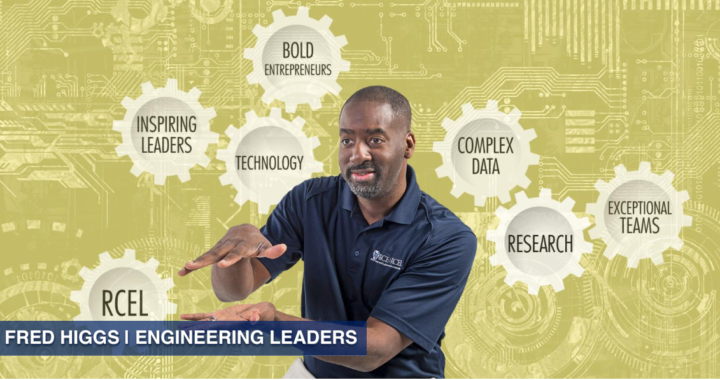“It’s simply not enough for a leader to have vision,” said Fred Higgs. “A true leader also knows how to inspire others to execute that vision and in a way that benefits an entire organization.” As the faculty director of the Rice Center for Engineering Leadership (RCEL), Higgs employs his lifelong passion for building — both things and teams of people — to help craft leaders every single day.
Today, Higgs and others are predicting a surge in demand for engineers as emerging technologies open new paths for eager problem-solvers. “In elementary school, I thought I wanted to be a scientist because, like me, they did well in math,” said Higgs, the John and Ann Doerr Professor in Mechanical Engineering and professor of mechanical engineering. “My sixth-grade teacher encouraged me to go into engineering, because I wanted to build things like space shuttles. She said it’s not the scientists who built the space shuttles, it’s the engineers.”
“It’s simply not enough for a leader to have vision.”
“Now, I think engineering is bigger than ever,” he said. “Engineering is the best major to pursue if you are passionate about it — the potential is limitless. We’re in a time in society where the acceleration of technology is at a mind-blowing pace, and the opportunities that are being created by engineering are right in front of us.” Higgs sees engineering pioneers as the key to unlocking the full potential of machine-generated complex data. “The biggest challenges that I see in engineering have to do with the fact that machines are going to be able to interpret a lot more complex information a lot faster than they used to,” he said. “It‘s going to be more data than the human mind is capable of digesting, so we’re going to need to be able to deploy teams in such a way that they can interpret, react to, and build products and solutions based off these incredible amounts of information.”
Rice Center for Engineering Leadership
Higgs’ vision for RCEL prepares engineers to become inspiring leaders, exceptional team members, effective communicators and bold entrepreneurs. RCEL provides skills not typically covered in an engineering curriculum and consists of both fundamental leadership courses and a career track. Students have four tracks to choose from — research, industry, nonengineering enabling pathway and entrepreneurship.
“We recognize that today’s engineering student is doing a host of new things and we want to be able to accommodate and help them to be leaders in whichever field they choose,” he said. “More engineers knowing how to leverage technology to generate solutions in any field is a good thing — whether you’re president of the United States or you’re overseeing a hospital.”
Advice for Students
Higgs advises engineering students to lead with passion. “Figure out how to impact the world in a way that excites you, and discover which engineering path that aligns with,” Higgs said. “Then you’ll be able to change the world when you’re excited about your work and the change you’re making in society.”
Many of the most important changes in the world today are driven by the creations of engineers and vanguards in the field who are at the forefront of these advancements. “Leadership is the key component that’s going to help society to flourish in an age where technology and smart sensors are able to interpret almost everything,” he said.
The Future of Engineering
We live in a world in which labor, information and money can often be had in an instant. A few clicks of a smartphone allows you to hire services, pay for products and obtain information in seconds. “The distance between starting a company and needing additional staff to help run it is pretty small,” Higgs said, “So now the engineer is empowered to change the world and start that company or take on these opportunities instantly.”
The future of engineering lies in leaders who motivate and guide truly collaborative teams to achieve their full potential. “Because no single person will be smart enough to handle all of the data that results from the advent of analytics and artificial intelligence, engineering leaders will need to inspire, educate and develop teams to efficiently interpret how to react to data and create solutions,” he said. “Otherwise, opportunities will be left on the table and potential will be lost. When we harness our emotional intelligence as humans, and work hand in hand with machines, the future of engineering will continue to be incredibly exciting and successful.”
Find out more:
Fred Higgs, George R. Brown School of Engineering
Rice Center for Engineering Leadership

